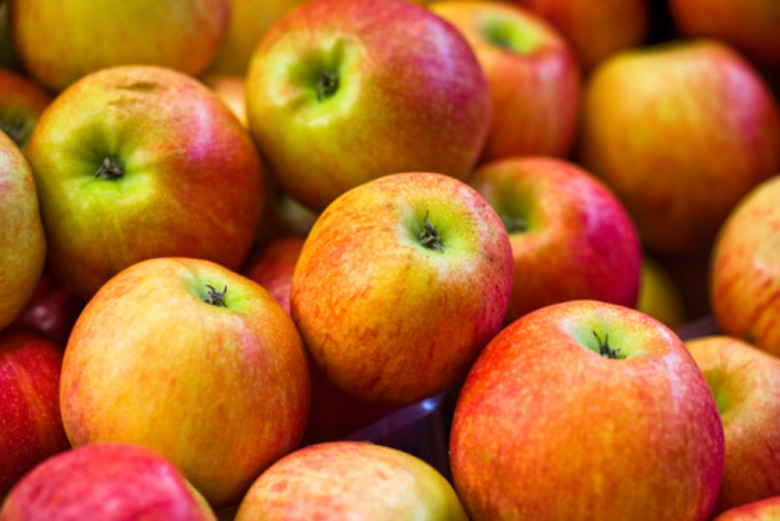Parts Of A Fruit: The Apple
A single apple is comprised of many parts that make up the whole fruit. Apple skin protects and prolongs the life of the fruit, but once the skin is penetrated, shelf life diminishes quickly unless you eat the apple soon after cutting into it. The skin contains a mix of nutrients related to those found within the pulp of the apple. Seeds and stems make up the center of the apple, and some nutrients are found within these parts as well.
Skin
The skin is one of the most vital parts of an apple because this exterior shell skin protects the pulp by acting as a barrier. The skin is high in vitamin C, calcium and potassium, but apple skins also have the ability to absorb toxins from pesticides and herbicides. Buy organic apples, or wash your fruit thoroughly before eating. Apple skin also varies greatly in taste, texture and color. Some apples are slightly glossy with thin skin, while other apples have thick skin but no shine. "Granny-Smith" apples are light green and slightly sour yet still sweet. "Jonagold" skin is a mixture of red and green with a sweet and tangy flavor.
- A single apple is comprised of many parts that make up the whole fruit.
- Apple skin protects and prolongs the life of the fruit, but once the skin is penetrated, shelf life diminishes quickly unless you eat the apple soon after cutting into it.
Stem
The apple stem does contain some nutrition, such as fiber and iron. However, stems are typically thrown away because they are generally not tasty. The stem holds the core of the apple together and anchors the fruit on the tree as the apple grows. Chop up fresh apples and juice the fruit with the stem and seeds included. Your body can benefit from the added nutrients found in the stem.
Pulp
The pulp, also called the flesh, is just beneath the skin of the apple. This part of the apple contains a great deal of nutrition including pectin, vitamin C, calcium and other minerals. This part of the apple is also the sweetest. Different types of apples vary in taste, but most apples have a sweet or slightly tangy taste. The nutrients inside apples can potentially help improve digestion and may prevent certain diseases, such as colon cancers.
- The apple stem does contain some nutrition, such as fiber and iron.
Seeds
Apple seeds are contained inside the core of the apple. The seeds have a bitter taste, so people usually don't eat them. However, the seeds are still safe for consumption. The seeds contain fiber and minerals such as phosphorus. Add nutrient-dense apple seeds to your favorite smoothie to disguise the taste.
